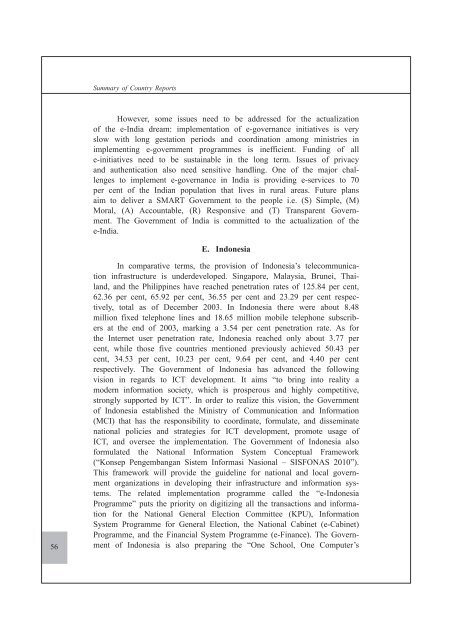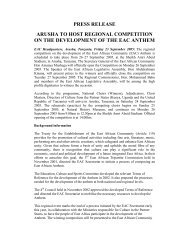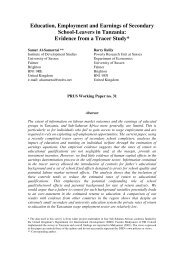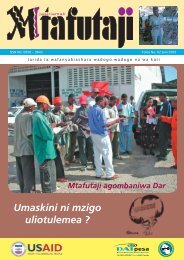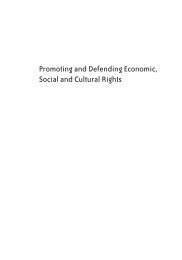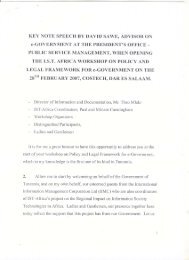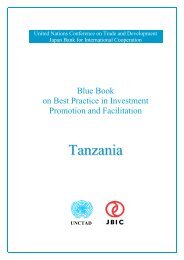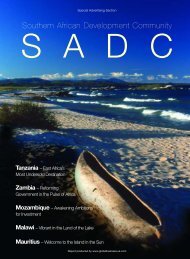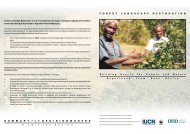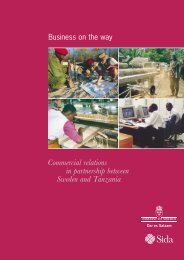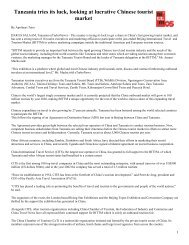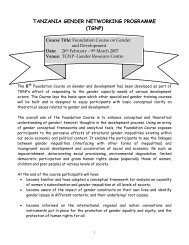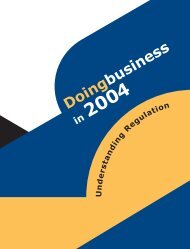Designing e-Government for the Poor - Tanzania Development ...
Designing e-Government for the Poor - Tanzania Development ...
Designing e-Government for the Poor - Tanzania Development ...
You also want an ePaper? Increase the reach of your titles
YUMPU automatically turns print PDFs into web optimized ePapers that Google loves.
56<br />
Summary of Country Reports<br />
However, some issues need to be addressed <strong>for</strong> <strong>the</strong> actualization<br />
of <strong>the</strong> e-India dream: implementation of e-governance initiatives is very<br />
slow with long gestation periods and coordination among ministries in<br />
implementing e-government programmes is inefficient. Funding of all<br />
e-initiatives need to be sustainable in <strong>the</strong> long term. Issues of privacy<br />
and au<strong>the</strong>ntication also need sensitive handling. One of <strong>the</strong> major challenges<br />
to implement e-governance in India is providing e-services to 70<br />
per cent of <strong>the</strong> Indian population that lives in rural areas. Future plans<br />
aim to deliver a SMART <strong>Government</strong> to <strong>the</strong> people i.e. (S) Simple, (M)<br />
Moral, (A) Accountable, (R) Responsive and (T) Transparent <strong>Government</strong>.<br />
The <strong>Government</strong> of India is committed to <strong>the</strong> actualization of <strong>the</strong><br />
e-India.<br />
E. Indonesia<br />
In comparative terms, <strong>the</strong> provision of Indonesia’s telecommunication<br />
infrastructure is underdeveloped. Singapore, Malaysia, Brunei, Thailand,<br />
and <strong>the</strong> Philippines have reached penetration rates of 125.84 per cent,<br />
62.36 per cent, 65.92 per cent, 36.55 per cent and 23.29 per cent respectively,<br />
total as of December 2003. In Indonesia <strong>the</strong>re were about 8.48<br />
million fixed telephone lines and 18.65 million mobile telephone subscribers<br />
at <strong>the</strong> end of 2003, marking a 3.54 per cent penetration rate. As <strong>for</strong><br />
<strong>the</strong> Internet user penetration rate, Indonesia reached only about 3.77 per<br />
cent, while those five countries mentioned previously achieved 50.43 per<br />
cent, 34.53 per cent, 10.23 per cent, 9.64 per cent, and 4.40 per cent<br />
respectively. The <strong>Government</strong> of Indonesia has advanced <strong>the</strong> following<br />
vision in regards to ICT development. It aims “to bring into reality a<br />
modern in<strong>for</strong>mation society, which is prosperous and highly competitive,<br />
strongly supported by ICT”. In order to realize this vision, <strong>the</strong> <strong>Government</strong><br />
of Indonesia established <strong>the</strong> Ministry of Communication and In<strong>for</strong>mation<br />
(MCI) that has <strong>the</strong> responsibility to coordinate, <strong>for</strong>mulate, and disseminate<br />
national policies and strategies <strong>for</strong> ICT development, promote usage of<br />
ICT, and oversee <strong>the</strong> implementation. The <strong>Government</strong> of Indonesia also<br />
<strong>for</strong>mulated <strong>the</strong> National In<strong>for</strong>mation System Conceptual Framework<br />
(“Konsep Pengembangan Sistem In<strong>for</strong>masi Nasional – SISFONAS 2010”).<br />
This framework will provide <strong>the</strong> guideline <strong>for</strong> national and local government<br />
organizations in developing <strong>the</strong>ir infrastructure and in<strong>for</strong>mation systems.<br />
The related implementation programme called <strong>the</strong> “e-Indonesia<br />
Programme” puts <strong>the</strong> priority on digitizing all <strong>the</strong> transactions and in<strong>for</strong>mation<br />
<strong>for</strong> <strong>the</strong> National General Election Committee (KPU), In<strong>for</strong>mation<br />
System Programme <strong>for</strong> General Election, <strong>the</strong> National Cabinet (e-Cabinet)<br />
Programme, and <strong>the</strong> Financial System Programme (e-Finance). The <strong>Government</strong><br />
of Indonesia is also preparing <strong>the</strong> “One School, One Computer’s


